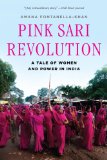Summary | Excerpt | Reviews | Beyond the Book | Readalikes | Genres & Themes | Author Bio

Critics' Opinion:
Readers' Opinion:
First Published:
Aug 2013, 304 pages
Paperback:
Aug 2014, 304 pages
 Book Reviewed by:
Book Reviewed by:
Kim Kovacs
Buy This Book
Excerpt
Pink Sari Revolution
On August 2, 2006, less than a year after Sampat started the gang, she was sitting on her patio with Babuji and Lakhan when she received a visit from a woman called Sushila, a mother of eight living below the poverty line. Between sobs, Sushila told Sampat that the police had beaten up and taken away her husband, Bare Lal, after a dispute he had had with a neighbor a few days earlier. Sushila's husband was being detained without any charge, and the police hadn't provided his family with any information about the arrest.
Sampat was not surprised by Sushila's story—by then she had handled numerous cases involving illegal detention, which was rampant in many parts of India where domestic law allows the police to arrest individuals on the mere basis of "reasonable suspicion." There are virtually no remedies available to wrongfully imprisoned citizens, and offending officers are rarely disciplined. It is a system in which police can wield their power to arrest for a myriad of unlawful purposes, including to extort, to inflate arrest quotas, and to silence citizens who dare to make complaints about them. This is why Sushila felt powerless in the face of her husband's sudden arrest.
"I go to the police station to meet him, but they always tell me to go away," Sushila told Sampat that day, breaking down. "How will I look after my children on my own? Who will feed them?" she asked tearfully.
After Sushila narrated her story, Sampat promised to accompany her to the Atarra police station. "I'll beat them with my own hands if they don't listen to us," Sampat told her confidently as they walked the short distance to the station. Sampat often illustrates how she would make good on such threats by wildly slapping and punching her imaginary opponent, until she snaps out of her violent reveries with a torrent of hoarse, hearty chuckles that make her cheeks rosy. In India, the majority of complaints are made by traveling to a police station, as emergency helplines are barely functional or existent. Many ordinary Indians, especially women, enter police stations with a sense of dread and anxiety and often refuse to go after dark. Far too often, newspapers carry reports of sexual molestation, rape, and even murder carried out by officers in stations. One of the stories that recently hit national headlines told of a woman who alleges she was gang-raped by officers after they forced her to drink alcohol. She had gone to the station because she had been told, erroneously, that she had been offered a job.
When Sampat arrived at the police station with Sushila in tow, Sampat approached the station officer, a man called Zameer Ul Hassan. "Why are you keeping her husband? You should charge him or let him go!" Sampat snapped. The officer demanded to know who she was.
"You don't know, what? I'm Sampat Pal, leader of the Pink Gang." The station officer was not impressed with her credentials. "He told me many people come here, trying to act like netas"—referring to leaders and people with political power—"don't think I'm going to listen to you," Sampat recalls.
"If you don't listen now, maybe you will when I come back with a hundred women armed with sticks?" Sampat replied testily. "Bring, bring," he said in impatient monosyllables, and sent them away.
As they left the station, Sampat told Sushila to meet her at the office at eleven o'clock the next day. "Then he'll see who Sampat Pal is," she said angrily. Leaving Sushila, Sampat marched over to Uraiya Purva, where some of the initial Pink Gang members lived. Uraiya Purva is within walking distance from Sampat's office; if you take a left from her patio and walk half a mile, you get to a canal with dark-green currents where those without running water bathe, wash their clothes, and rinse steel cooking pots. If you cross the bridge that goes over the canal and continue a few more miles, you reach the field-rimmed cluster of mud huts.
Excerpted from Pink Sari Revolution: A Tale of Women and Power in India by Amana Fontanella-Khan. Copyright © 2013 by Amana Fontanella-Khan. With permission of the publisher, W.W. Norton & Company.





The Funeral Cryer by Wenyan Lu
Debut novelist Wenyan Lu brings us this witty yet profound story about one woman's midlife reawakening in contemporary rural China.
Your guide toexceptional books
BookBrowse seeks out and recommends the best in contemporary fiction and nonfiction—books that not only engage and entertain but also deepen our understanding of ourselves and the world around us.